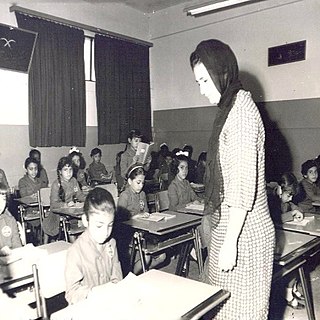Related Research Articles

The Arabian Peninsula, or Arabia, is a peninsula in West Asia, situated northeast of Africa on the Arabian Plate. At 3,237,500 km2 (1,250,000 sq mi), comparable in size to India, the Arabian Peninsula is the largest peninsula in the world.

Saudi Arabia, officially the Kingdom of Saudi Arabia (KSA), is a country in West Asia and the Middle East. It covers the bulk of the Arabian Peninsula and has a land area of about 2150000 km2, making it the fifth-largest country in Asia and the largest in the Middle East. It is bordered by the Red Sea to the west; Jordan, Iraq, and Kuwait to the north; the Persian Gulf, Qatar and the United Arab Emirates to the east; Oman to the southeast; and Yemen to the south. Bahrain is an island country off its east coast. The Gulf of Aqaba in the northwest separates Saudi Arabia from Egypt and Israel. Saudi Arabia is the only country with a coastline along both the Red Sea and the Persian Gulf, and most of its terrain consists of arid desert, lowland, steppe, and mountains. The capital and largest city is Riyadh; the kingdom also hosts Islam's two holiest cities of Mecca and Medina.

Asharq Al-Awsat is an Arabic international newspaper headquartered in London. A pioneer of the "off-shore" model in the Arabic press, the paper is often noted for its distinctive green-tinted pages.

Al Buraimi Governorate is one of the 11 governorates of Oman. The area was part of Ad Dhahirah Region until October 2006, when a new governorate was created from the Wilayats (Provinces) of Al Buraymi and Mahdah. A third wilayat, As-Sunaynah, was created from parts of the two. Dr. Hamad bin Ahmed Al Busaidi has been governor since 2020.

Samira Khashoggi was a Saudi Arabian progressive author, as well as the founder of Al Sharkiah magazine. She was the sister of the Saudi businessman Adnan Khashoggi. She was the first wife of Egyptian businessman Mohamed Al-Fayed and the mother of filmmaker Dodi Al-Fayed. She died of a heart attack in 1986 at the age of 51.
Al Madina is a newspaper published in Jeddah, Saudi Arabia. The paper is one of the oldest newspapers published in the country.

Iffat bint Mohammad Al Thunayan was a Turkish-born education activist and Saudi princess who was the most prominent wife of King Faisal of Saudi Arabia. She is sometimes called Queen Iffat or Princess Iffat. She is known for her efforts in the improvement of Saudi education. She was the founder of Taif model school and the first girl's college in Saudi Arabia.
Multiple forms of media including books, newspapers, magazines, films, television, and content published on the Internet are censored in Saudi Arabia.

Women's rights in Saudi Arabia is a topic of concern and controversy internationally. Women in Saudi Arabia experience widespread discrimination in Saudi politics, economy and society.
Wajeha al-Huwaider is a Saudi activist and writer, who played key roles in the anti male-guardianship and women to drive campaigns during the early twenty-first century. She is a co-founder of The Association for the Protection and Defense of Women's Rights in Saudi Arabia. As a result of her work, al-Huwaider has been the recipient of both significant legal prosecution in Saudi Arabia and international praise.

Arab News is an English-language daily newspaper published in Saudi Arabia. It is published from Riyadh. The target audiences of the paper, which is published in broadsheet format, are businessmen, executives and diplomats.

Rob L. Wagner is an American documentary filmmaker and journalist covering Middle East issues, particularly political and social topics in Saudi Arabia. His documentaries focus on history. In 2015 he was the Saudi Arabia correspondent for the London-based The Arab Weekly newspaper. He previous served as managing editor of the Arab News, an English-language daily newspaper based in Jeddah, Saudi Arabia, and the Saudi Gazette, a competitor of the Arab News. Wagner was also the top editor of Construction Week magazine in Dubai and is the author of numerous history books.

Al Riyadh is a Riyadh-based, pro-government Saudi daily newspaper. Its sister paper was Riyadh Daily that was in circulation between 2003 and 1 January 2004. Al Riyadh is one of the dominant papers in Nejd.

Al Jazirah is a daily Arabic newspaper published in Riyadh, Saudi Arabia. Its sister newspaper is Al Masaiya, which is the only afternoon newspaper in the country with limited influence and readership.
Television in Saudi Arabia was introduced in 1965, but is now dominated by just five major companies: Middle East Broadcasting Center, SM Enterprise TV, Lebanese Broadcasting Corporation, Rotana and Saudi TV. Together, they control 80% of the pan-Arab broadcasting market. Saudi Arabia is a major market for pan-Arab satellite and pay-TV. Saudi investors are behind the major networks MBC, which is based in Dubai, and Emirates based OSN. The Saudi government estimated that in 2000 the average Saudi spent 50% to 100% more time watching television than his or her European or US counterpart. On average, 2.7 hours are spent daily watching TV in Saudi Arabia.

Women played a variety of roles in the Arab Spring, but its impact on women and their rights is unclear. The Arab Spring was a series of demonstrations, protests, and civil wars against authoritarian regimes that started in Tunisia and spread to much of the Arab world. The leaders of Tunisia, Egypt, Libya, and Yemen were overthrown; Bahrain has experienced sustained civil disorder, and the protests in Syria have become a civil war. Other Arab countries experienced protests as well.
Fawziyya Abu Khalid is a Saudi Arabian poet, essayist, sociologist, and professor. Her poetry is noted for its prominent political motifs and focus on women's ability to attain education and freedom. Her literary reputation was established by the publication of her first poetry collection, Until When Will They Abduct You on Your Wedding Night? (1974). She went on to publish two other poetry collections, entitled the Secret Readings in the History of Arab Silence (1985) and Mirage Water (1995).
Su'ad al-Fatih Mohammed al-Badawi was a Sudanese academic, politician, and journalist. She was known both for her advocacy of women's rights and for her support of Islamism.
The role of women in the arts and cultural life in the highly patriarchal society of Saudi Arabia is very limited. Below, examples of contributions in literature, music, cinema, and television that have been made by women in Saudi Arabia are discussed.

Manal Al Dowayan is a Saudi Arabian contemporary artist, best known for her installation piece Suspended Together from the Home Ground Exhibition at the Barjeel Art Foundation in 2011. She has shown work in a number of shows including the 2012 Soft Power show at Alan Art Center in Riyadh, Saudi Arabia, the 2013 Journey of Belonging, a solo show at Athr Gallery in Jeddah, Saudi Arabia, the 2017 100 Masterpieces of Modern and Contemporary Arab Art in Paris, France, as well as having her work exhibited in the 2014 USA Biennial in Houston, the 2015 P.3: Prospect New Orleans USA Biennial Notes For Now, and the Venice Biennale in the Future of a Promise Exhibition. Her work spans many mediums from photography to installation and focuses on a progressive examination and critique women's roles in Saudi society.
References
- 1 2 Radwa Ashour; Ferial Ghazoul; Hasna Reda-Mekdashi (1 November 2008). Arab Women Writers: A Critical Reference Guide, 1873-1999. American University in Cairo Press. pp. 459–. ISBN 978-977-416-267-1.
- ↑ Sebastian Maisel. Saudi Arabia and the Gulf Arab States Today: An Encyclopedia of Life in the Arab States. Greenwood Press. pp. 267–. ISBN 978-0-313-34442-8.
- ↑ Hend T. Al-Sudairy (11 May 2017). Modern Woman in the Kingdom of Saudi Arabia: Rights, Challenges and Achievements. Cambridge Scholars Publishing. pp. 60–. ISBN 978-1-4438-9328-2.